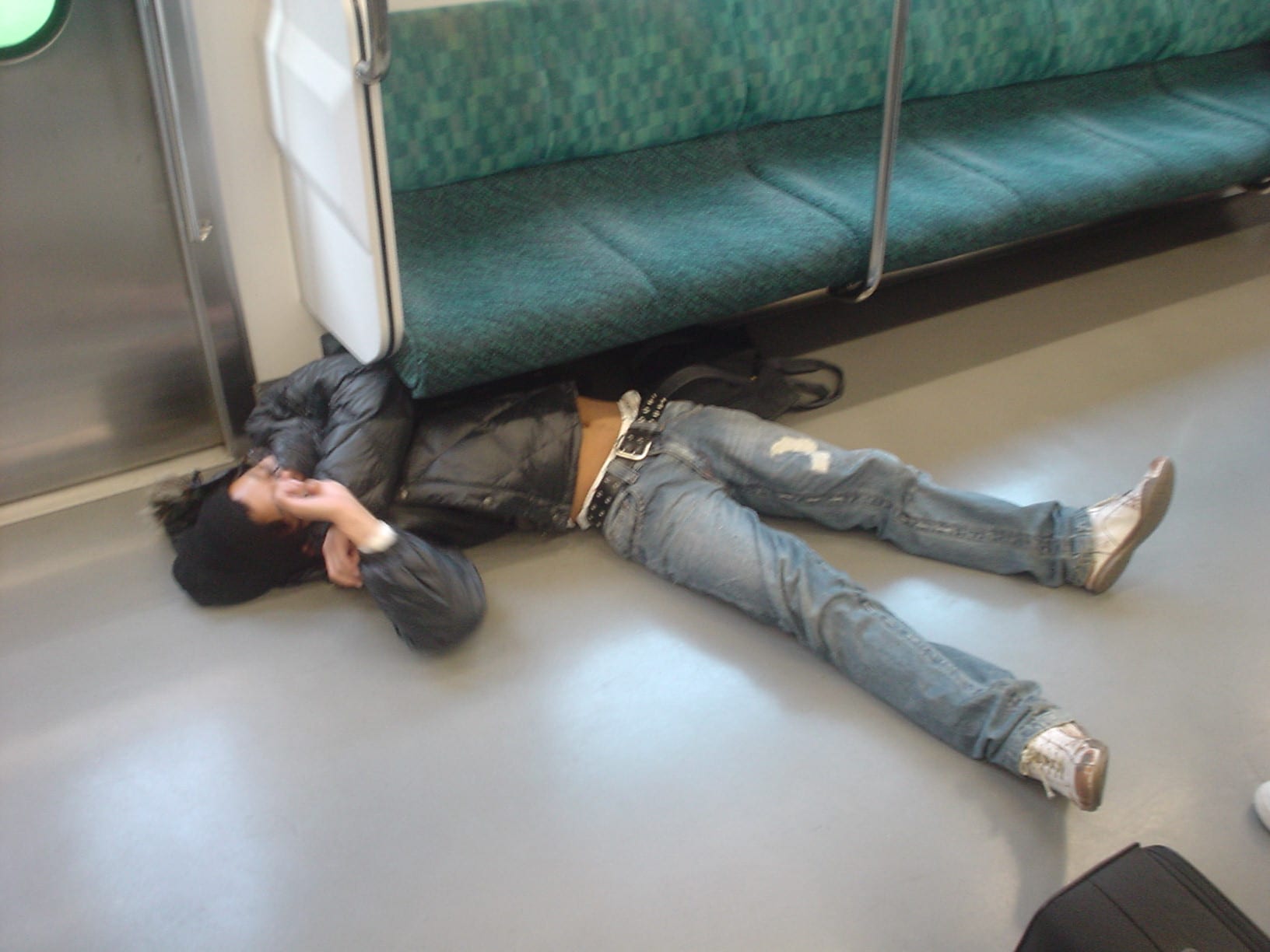Sleep: we all need it, and most of us never seem to get enough of it. A good night’s rest helps detoxify the brain, promotes memory retention, and boosts your immune system, just to name a few benefits.
For a long time, however, sleep was considered a “passive” activity where neither the brain nor the body did much of anything. It was only with the discovery of Rapid Eye Movement (REM) sleep in 1953 that scientists saw just how busy our brains and bodies remain while we catch 40 winks.

Photo Credit: Pixabay
We’ve come a long way in our understanding of sleep since then, but there are some sleep myths that linger on to this day. Here are 7 of the most popular ones.
1. Never wake a sleepwalker.
We’ve all heard you shouldn’t try to wake someone who is sleepwalking because the shock might give them a heart attack. The truth, as always, is more complicated.
When we sleep, we alternate between lighter and deeper sleep cycles where different parts of the brain are active. Italian researchers found that sleepwalkers may have an imbalance between parts of the brain that are awake and parts that are asleep.

Photo Credit: Pixabay
Essentially, sleepwalkers have their conscious memory and decision-making turned off, while mechanical behaviors like walking, talking, peeing, and sometimes even driving, are still turned on. That’s why, according to Stanford sleep specialist Dr. Mark Mahowald, you’ll likely never see a sleepwalker doing something they can’t already do in real life.
All that said, there appears to be virtually no scientific evidence actually linking waking a sleepwalker to serious consequences like heart attacks. That’s not to say, however, that waking sleepwalkers up from a deep sleep isn’t going to cause a certain level of distress. Just think of how stressed you get when something startles you from a dead sleep. Some folks also swing out when they feel startled, so you might want to watch your own safety too.

Photo Credit: Pixabay
All in all, you can wake up a sleepwalker… but you should probably still be gentle!
2. Snoring is harmless.
At some point in all of our lives, we’ve come across someone who snores in their sleep. It’s definitely annoying if you’re sleeping anywhere near them, but snoring is generally seen as just that – a harmless annoyance.

Photo Credit: Pixabay
While a little snoring doesn’t really hurt anyone, chronic snoring can actually be a pretty serious problem. Heavy snoring can be indicative of obstructive sleep apnea, a serious condition which leads to a higher risk of heart attacks, strokes, and even death if left untreated.
Additionally, heavy snoring can also lead to less restful sleep, which deprives you of all the health benefits of a good night’s rest that we mentioned at the start of the video.
3. You can “catch up” on sleep over the weekend.
When it comes to sleep, most of us are drowning in debt. It’s generally accepted that the average adult needs 6-10 hours of sleep a night. According to the CDC, however, a full third of American adults aren’t getting enough sleep.

Photo Credit: Pixabay
Being sleep deprived leads to fuzzy-headedness and irritability in the short term. If you get some extra sleep within a day or so of not getting enough, you’ll be alright. But wait just a little too long, and you may not fully recover. Worse still, if your “sleep debt” keeps rising up unchecked, it can lead to increased risk for more persistent and chronic health issues like diabetes, obesity, heart disease, and stroke!
The bottom line? Do whatever you can to get a healthy amount of sleep every night, and make up for the occasional lapse as soon as possible. If you lose sleep for too long, there’s simply no coming back.
4. Naps are a waste of time.
In Japan, public napping is a sign of hard work. It’s called ‘inemuri,’ which means ‘sleeping on duty’ or ‘sleeping while present.’ Because falling asleep in public is thought to be a symptom of working yourself to exhaustion, it’s socially acceptable in restaurants, stores, commuter trains, and on park benches- as long as you don’t sprawl out and take up too much space.

Photo Credit: Wikimedia CC
Although the idea of a mid-afternoon nap is also quite popular in many other parts of the world, the idea of taking a nap as an adult is more or less synonymous with being lazy here in America; it’s wasting valuable time when you could be doing work. Besides, so many people wake up groggy from a nap that it’s probably better to chug some coffee and just grind through that 3:00 o’clock slump – right?

Photo Credit: Pixabay
It actually depends on the kind of nap you take. As we learned earlier, sleep consists of alternating cycles of light and deep sleep. The key to a good nap is to stay within the first two stages of sleep, which are lighter. Going past that mark (usually around 25-30 minutes) is when you will start waking up all cranky. Short naps, a.k.a. “Catnaps,” like this have actually been found to boost brain activity and performance – so maybe that afternoon siesta isn’t such a bad idea after all.
5. Eight hours of sleep a night is the magic number.
We’ve all heard how crucial it is to get that all-important 8 hours of sleep a night. That number has been batted around for a long time, possibly because it tends to fall right in between the recommended range for most adults and children.

Photo Credit: Freepik
But think about it – we’re all so different from one another from our body types to our lifestyles. Just like you need to eat the right amount of calories based on your gender, age, activity level, weight, height, dietary restrictions, etc., the amount of sleep you need isn’t going to be a “one-size-fits-all” situation either.
There’s evidence that suggests that while we do tend to favor eight total hours of sleep a night, we’d be better off sleeping in two 4-hour “shifts” with a brief waking intermission in the middle. There’s also historical evidence that people once did exactly that, using the waking period in between to relax, do things around the house, or… do each other!
6. Teenagers sleep so much because they’re lazy.
Stop me if this sounds familiar: your teenager seems to stay up way too late every night, and apparently can’t get enough sleep if they slept all day long. Many an exasperated parent has wondered why their teen seems to be so darn lazy, but it’s not their fault!

Photo Credit: Pixabay
It turns out that humans experience a natural shift in their circadian rhythms during adolescence, causing a delay of about 2-3 hours. Unfortunately, society hasn’t accounted for this and schools still start much earlier in the morning than teens are biologically ready for.
Teens also need slightly more sleep per night than adults and have a higher threshold for not suffering ill effects from oversleeping the way adults do. So the next time your teen is dragging their feet in the morning, have a little sympathy – much like cracking voices and pimply faces, it’s just another part of growing up.
7. Turkey makes you sleepy.
This is a really pervasive myth, so much so that I even knew someone who wouldn’t eat sliced deli turkey for lunch because it’d “make [her] sleepy.”
The substance blamed for turkey’s sleep-inducing qualities is tryptophan. While it does have an effect on serotonin levels and acts as a natural sedative, there is a wide range of everyday foods with comparable or even higher amounts of tryptophan than turkey.

Photo Credit: Wikimedia Commons
So what’s really causing that post-Thanksgiving dinner drowsiness? It’s not the turkey, it’s everything else. Did you really think loading up on all those carb-heavy sides, desserts, and alc*holic drinks during the holiday feast weren’t going to catch up to you?
If you enjoyed this, you should also check out:
https://didyouknowfacts.com/pupils-get-bigger-youre-turned/
Scientists Tweet the Most Ridiculous Stock Photos of Their Jobs






